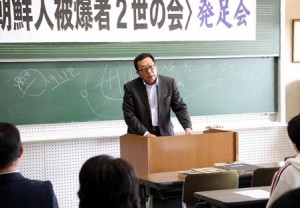Second-generation Korean A-bomb survivors’ group is founded in Hiroshima
Mar. 30, 2015
by Koji Higuchi, Staff Writer
An association of second-generation Korean A-bomb survivors was founded on March 21 by the children of Korean survivors living in Hiroshima Prefecture. With this year marking the 70th anniversary of the atomic bombing, the group is calling on second-generation survivors living in Hiroshima Prefecture to join the group in order to hand down their parent’s experiences to younger generations. They also plan to carry out a survey of survivors in North Korea and call for the Japanese government to increase medical assistance for survivors.
On March 21, a meeting to establish the group was held at the Hiroshima Korean School in Higashi Ward, Hiroshima, where seven people in their 40s to 60s were installed as board members. Han Jeong Mi, 57, the chair of the school’s board of directors, was selected to head the group. The group will now begin efforts to recruit members. In his speech, Mr. Han mentioned that his mother was exposed to the atomic bomb at her home near Sorasayainao Shrine, in Naka Ward, approximately 600 meters from the hypocenter, and said with conviction, “We must not allow the survivors’ experiences to fade away. I’d like to fulfill my duty to help address this problem.”
Until now, surveys of survivors living in North Korea have been undertaken by the Council of Atom-bombed Koreans in Hiroshima (chaired by Lee Sil Gun), which was established in 1975 by a group of Korean A-bomb survivors in Hiroshima Prefecture. The association of second-generation survivors will work together with the council in continuing to carry out the surveys as well as pursue the aim of training storytellers who will convey the survivors’ experiences.
Kazuyoshi Yukawa, 68, the president of the Second Generation A-bomb Survivors Committee of the Hiroshima Prefectural Confederation of A-bomb Sufferers Organizations (Hidankyo, chaired by Sunao Tsuboi), took part in the inauguration meeting. He pledged his cooperation, saying, “We both face the same problem of how to convey the survivor’s experiences as the first-generation survivors advance in age. We need to deepen exchanges between the groups.”
(Originally published on March 22, 2015)
An association of second-generation Korean A-bomb survivors was founded on March 21 by the children of Korean survivors living in Hiroshima Prefecture. With this year marking the 70th anniversary of the atomic bombing, the group is calling on second-generation survivors living in Hiroshima Prefecture to join the group in order to hand down their parent’s experiences to younger generations. They also plan to carry out a survey of survivors in North Korea and call for the Japanese government to increase medical assistance for survivors.
On March 21, a meeting to establish the group was held at the Hiroshima Korean School in Higashi Ward, Hiroshima, where seven people in their 40s to 60s were installed as board members. Han Jeong Mi, 57, the chair of the school’s board of directors, was selected to head the group. The group will now begin efforts to recruit members. In his speech, Mr. Han mentioned that his mother was exposed to the atomic bomb at her home near Sorasayainao Shrine, in Naka Ward, approximately 600 meters from the hypocenter, and said with conviction, “We must not allow the survivors’ experiences to fade away. I’d like to fulfill my duty to help address this problem.”
Until now, surveys of survivors living in North Korea have been undertaken by the Council of Atom-bombed Koreans in Hiroshima (chaired by Lee Sil Gun), which was established in 1975 by a group of Korean A-bomb survivors in Hiroshima Prefecture. The association of second-generation survivors will work together with the council in continuing to carry out the surveys as well as pursue the aim of training storytellers who will convey the survivors’ experiences.
Kazuyoshi Yukawa, 68, the president of the Second Generation A-bomb Survivors Committee of the Hiroshima Prefectural Confederation of A-bomb Sufferers Organizations (Hidankyo, chaired by Sunao Tsuboi), took part in the inauguration meeting. He pledged his cooperation, saying, “We both face the same problem of how to convey the survivor’s experiences as the first-generation survivors advance in age. We need to deepen exchanges between the groups.”
(Originally published on March 22, 2015)







